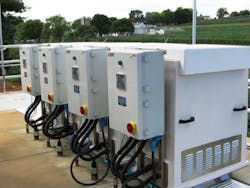Microwave-Powered UV Disinfection for Wastewater Treatment
In Pennsylvania Dutch Country, some things change slowly–if at all. Thousands of people living in towns like Strasburg, Bird-in-Hand, Manheim and Paradise continue to live without electricity, automobiles and many other modern conveniences.
But in this land of “plain” living, a local wastewater treatment plant has employed a revolutionary technology: the first ever microwave-powered ultraviolet disinfection system used by a sequencing batch reactor (SBR) treatment plant.
Leacock Township, Pa., located 70 miles west of Philadelphia, has operated an SBR wastewater treatment plant since 1992. Permitted for a flow of 450,000 gal per day (gpd), the plant serves the wastewater needs of approximately 5,000 customers. In the summer months, tourism increases flows by as much as 100,000 gpd.
The original plant’s disinfection was supplied by a chlorine gas system, which employed two 150-lb cylinders. After 17 years, the disinfection system was beginning to show its age and the cost to maintain it increased. Given the opportunity to investigate other disinfection systems, the township considered the use of ultraviolet (UV) disinfection and ozone.
After determining that an ozone disinfection system would not be as cost-effective as UV, the township focused its attention on a traditional UV disinfection system and a new technology: microwave-powered UV disinfection from Severn Trent Services.
A New System
The company’s MicroDynamics OCS 660 system uses microwaves to energize low-pressure, high-output electrode-free lamps to maximize a UVC output at 254 nanometers. With the electrodeless lamps, there are no electrical connections to fail, corrode or leak. The absence of electrodes eliminates the two major causes of traditional UV lamp failure: electrode breakage and lamp fade.
With the knowledge that the microwave UV lamps’ lifespan could potentially exceed 30,000 hours, which would minimize waste and reduce operating costs, the township selected the MicroDynamics system. Four modules were supplied to treat a peak flow rate of 2.4 million gal day (mgd) at the Leacock plant. One of the four modules serves as a redundant standby. ARRO Consulting Inc. served as the project’s design engineer and the plant was commissioned on Sept. 1, 2010.
According to Leacock Township Senior System Operator Bruce Ammon, another important feature of the MicroDynamics system was its unlimited start-stop ability and flow-pacing capability.
“Unlike traditional lamps, which limit starts and stops to four times a day, MicroDynamics lamps have no cycle limit,” he said. “And traditional lamp electrodes wear out due to successive heating and cooling caused by frequent starts and stops. Without an electrode, the MicroDynamics lamps can be turned on and off as often as needed, saving electricity costs. This is ideal for our SBR technology, which runs on cycles and requires complementary systems with coinciding start and stop treatment capability.”
Benefits of Change
The Leacock plant’s SBR system has a 31-minute decant process. As the microwave UV system begins operation five minutes before the decant process and continues for five minutes after its completion, the UV system is only in operation for 41 minutes per cycle.
The system activates and deactivates modules as needed based on an external flowmeter signal. The modules offer quick restart, providing a more finely tuned flow pace than is possible with traditional systems and saving money on electricity costs.
The system does not require chemical addition to clean the quartz sleeves, which leads to safer operating conditions. Unlike other UV systems whose lamps run more than 200°F, the quartz sleeve is kept at 115°F, making them less susceptible to foulants baking on the sleeves. Therefore, the sleeves are cleaned by a chemical-free wipe system.
After some early adjustments to the system including software upgrades, the microwave UV system has performed well, enabling the plant to meet all permit conditions.
Stan Shmia is a UV product manager for Severn Trent Services. Shmia can be reached at [email protected] or 215.997.3737.
